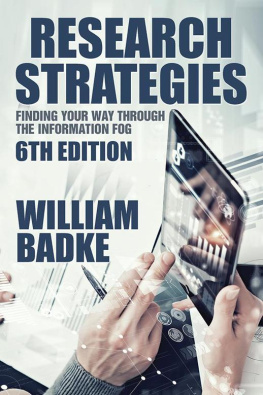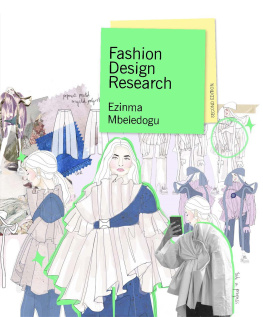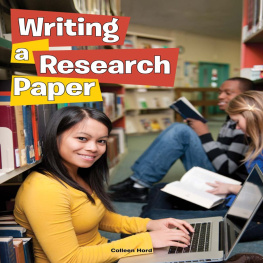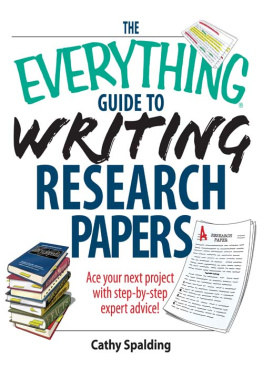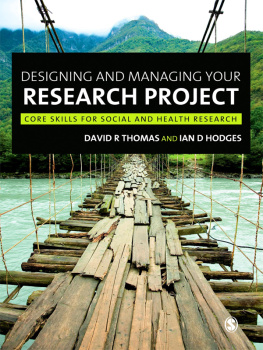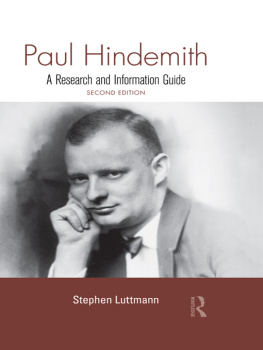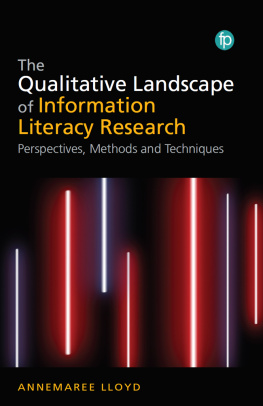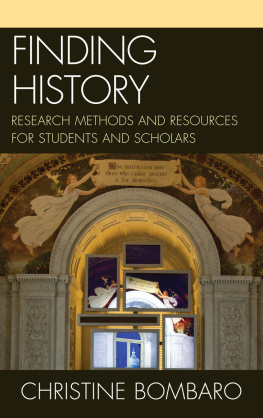RESEARCH
STRATEGIES
Finding Your Way Through
the Information Fog
6th Edition
WILLIAM BADKE

RESEARCH STRATEGIES
FINDING YOUR WAY THROUGH THE INFORMATION FOG
Copyright 2017 William Badke.
All rights reserved. No part of this book may be used or reproduced by any means, graphic, electronic, or mechanical, including photocopying, recording, taping or by any information storage retrieval system without the written permission of the author except in the case of brief quotations embodied in critical articles and reviews.
iUniverse
1663 Liberty Drive
Bloomington, IN 47403
www.iuniverse.com
1-800-Authors (1-800-288-4677)
Because of the dynamic nature of the Internet, any web addresses or links contained in this book may have changed since publication and may no longer be valid. The views expressed in this work are solely those of the author and do not necessarily reflect the views of the publisher, and the publisher hereby disclaims any responsibility for them.
Any people depicted in stock imagery provided by Thinkstock are models, and such images are being used for illustrative purposes only.
Certain stock imagery Thinkstock.
ISBN: 978-1-5320-1803-9 (sc)
ISBN: 978-1-5320-1804-6 (e)
Library of Congress Control Number: 2017904572
iUniverse rev. date: 04/03/2017
Acknowledgements and Additional Resources
Thanks to EBSCO Publishing for permission to use screenshots from their databases.
See the Research Strategies Website for:
- Updates: http://williambadke.com/updates .htm
- Live links: http://williambadke.com/links .htm
- Key to chapter study questions: http://williambadke.com/RSKey .htm
- Teaching resources: http://williambadke.com/TeachingResources .htm
See the Research Strategies Textbook site for more information about this book: http://williambadke.com/textbook .htm
Meet me on Facebook; search for: Research Strate gies
Contents
Everyone does research. Some just do it better than others.
This book is definitely for you if you are:
- a university student whose research projects have been patented as a cure for insomnia
- a Dilbert of industry whos been told to do a feasibility study on the expansion potential of winter ice cream bar sales in Nome, Alaska
- a simple honest person trying to find the truth behind the advertising so that the next car you buy wont be like your last disaster-mobile, the car that made you persona non grata at the automobile association
Are you ready for your next research project? Really ready? Do you have the skills and strategies to get the job done efficiently and effectively without panic attacks and the need for a long vacation when youre done? Do you have confidence that you can start with a topic about which you know nothing and end with an understanding of it that is neither trite nor superficial? Are you prepared to enjoy the experience? (Yes, I did say, Enjoy.)
If the previous paragraph has left you feeling somewhat queasy, this book is for you. Even if you think you have significant research skills, you can learn better ones if you take the time to read on. You have the privilege of living in the information age, with boundless opportunities all around you to find out anything about anything. But faced with a serious number of Internet sites, not to mention academic and commercial databases of increasing size and complexity, knowing how to navigate through the information fog isnt something you can pick up easily on your own. Truth to tell, there is a ton of studies telling us that most people have vastly higher opinions about their research ability than actual tests of that ability can demonstrate.
Yet you can hardly call yourself educated if you dont have really good skills to handle complex information systems and do research effectively, not in a world in which most careers are built more on what you can find out than what you already know.
Who am I to try to teach you about research? Just someone who has taught the strategies in this book to thousands of anxious university students, both undergraduate and graduate, for over 30 years (making me a dinosaur?), and who likes nothing better than to walk people through the information fog. I am Associate Librarian for Associated Canadian Theological Schools and Information Literacy at Trinity Western University. Being the author of a number of books and scholarly articles myself (see my bio at http://williambadke.com/badke.htm ), you can rest assured that Ive devoted a lot of my life to doing research and not just teaching it. So I understand what youre going through.
One caution: This book is about informational research. It wont teach you how to do a science experiment or determine the best way to train a rat how to ride a tiny bicycle (though it will help you do a literature review). But if you need to identify a problem, and then acquire and use information to address the problem, this book is for you.
Learning how to do research does not have to be painful. It can be fun. Honestly. Personally, research gives me so much pleasure that my family has to kidnap me out of the library whenever they want to go on an outing or buy groceries. You can have the same joy that I have. Read on.
Updates to the textbook will be posted at:
http://williambadke.com/Updates .htm
For live links to each of the URLs in Research Strategies: http://williambadke.com/links .htm
See my website for courses, syllabi, presentations etc.: http://williambadke.com/TeachingResources .htm
Meet me on Facebook. Search for: Research Strate gies
1
Welcome to the Information Fog
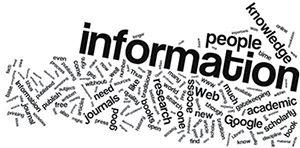
We have been living in the middle of a revolution since the 1990s. Not since the creation of the printing press (and maybe not ever) has our concept of information been so disrupted. The driving force of the information revolution is the World Wide Web, which has given us access to more knowledge than ever before in human history.
Information used to be scarce, thus creating a demand for experts who knew things and could share those things with the rest of us. Now we have Google, the information candy store, which makes information abundant and challenges the role of the expert. Information candy store? Yes. Google serves up lots of enticing stuff right there at our finger-tips, most of it looking good enough to devour. The down side of a candy store, if there ever could be a down side, is that candy tends to be loaded with empty calories.
No, Im not down on Google or Bing or whatever search engine suits your fancy. We wont be Google-bashing here. But there is so much more than Google. The revolution in information has led many of us to believe that Google is god, or at least the ultimate information source. But nothing is that simple. Fact is, we live in an era in which there is untold opportunity to go beyond Google. And we also live in an era that is much more complicated than it used to be.
At one time we thought we knew what information was. Now were not so sure. These days were buried in data, and defining what is and what is not genuine information is getting to be more of a challenge all the time. (For a related graphical presentation, see my Prezi, No One Knows for Sure what Information is Anymore, http://bit.ly/1S6 m4pb ).
Information is supposed to inform. That means it has to be reliable, relevant, current, and so on. There was a time when people believed that, given the right information, we could solve any problem the human race encountered. They thought that the power of reason could be used in a totally objective way to wade through all the data and come up with the right answers, even arrive at the truth. Now were no longer even sure what the questions are (and we cant remember last Tuesday).
Next page
